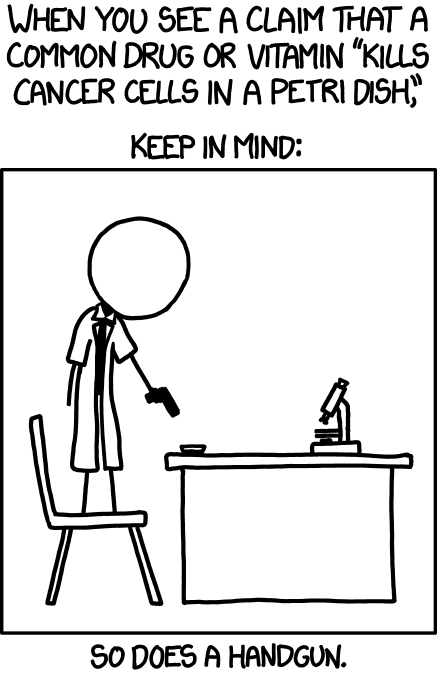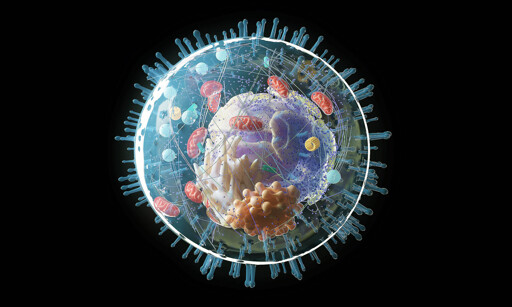In this study, the scientists simulated the process of spaced learning by examining two types of non-brain human cells — one from nerve tissue and one from kidney tissue — in a laboratory setting.
These cells were exposed to varying patterns of chemical signals, akin to the exposure of brain cells to neurotransmitter patterns when we learn new information.
The intriguing part? These non-brain cells also switched on a “memory gene” – the same gene that brain cells activate when they detect information patterns and reorganize their connections to form memories.
Memory is stored in the balls
Just to recap, sperm, pee, microplastics, and memories are stored in the balls? Am I missing anything? I can’t remember. Maybe my balls are too full of microplastics to recall.
Data.

I’m sure you could fit a few dollars in loose change in there to.
I keep cement in mine
Mine are filled with brass
Urine is not stored in the balls. I’m a doctor you can trust me on this
Even if you weren’t a doctor I’d agree with you. I was taught it’s stored in the bladder in ninth grade. Pretty sure that continues throughout your adult life. Lol
I thought you were referencing the conversation on Reddit or Twitter or something where someone had said “I’m a doctor, pee is definitely not stored in the balls” and then a really long argument ensued where the dude was pretty adamant that pee is stored in the balls. I just wanted to be the Dr
If you’re a doctor, then I’m a nun :)
😆
Thanks i actually needed this comment to be here.
Well some species do potentially have “genetic memories” so maybe some stuff actually could be
And when you fuck someone, you’re giving them your memories.
Vaginas remember the bad balls.
Still better that “pee is stored in the brain”
fascinating, this concept is a core to the theravadan buddhist practice of vipassana meditation, which is supposed to be what the buddha himself actually taught in his wandering classroom. I always took that bit with a grain of salt assuming it was just an old misunderstanding of what’s going on but the kind of non-thought memories appears to be exactly what is described.
it’s called Vasana and it’s said to be like ‘perfume lingering in cloth’, the residual karma from our actions that shapes our future and influences automatic actions and preferences. Trauma is said to be stored in the body as well as Sankhara.
I have always viewed vipassana as mental martial arts more than religion, and brushed off all the reincarnation and other inexplicable stuff. fascinating to hear scientists confirming what philosophers came up with thousands of years ago.
in a laboratory setting.

Technically, a handgun also kills cancer in vivo. The problem is the cost to the host body.
Okay but what you’re saying is if I hired a good enough marksman to shoot the cancer out of my body without killing me then that’s a good thing right?
I mean, that’s basically what we do with gamma radiation and chemotherapy, just a little bit more ballistic, right?
Exactly! The only difference is that those use very tiny bullets.
Isn’t the title misleading? A cell switching on the same gen neurons use to connect, if exposed to substance used to transmit information, doesn’t mean it stores or transmits any memories. It seems it doesn’t even do anything more, like forming dendrites or “answering” chemically.
Guess that’s just a side-effect of how the gen is exposed.
It’s more than that. People who have had heart transplants can inherit memories and personality traits from the donor. Cells remember more than they let on and can pass these memories to the recipient.
See this study. I think it’s safe to say we have some empirical evidence for this. In the linked study, there’s a kid who received a heart from another kid who died trying to retrieve a power ranger and somehow the donor knew that without anyone telling him. Another kid received a heart from a kid who drowned and he became afraid of water.
If I read the cited sources and they turn out to be a bunch of untested hypotheses based on poorly conducted studies… I’ll be mad.
Just skimming through it makes a bad first impression.
…I’m not even trying to be derisive. I’m just really angry at how much “there’s a study” has become “there’s proof”. And I shouldn’t even be mad because communicating that difference should be the authors’ job.
If you value your time, don’t read any further because I’m just going to vent a little:
So I lack any formal education (apart from ficking school). The best thing I can say about myself is that I can hold and mostly understand a conversation with people who are actually educated in their field.
But some studies are bad. Like bad-bad. So bad that I think, most people who can read should be able to recognize their flaws if they actually read them.
For example:
I read a study a while back about genetic (as opposed to learned) prepositions of monkeys in relation to their biological sex and preference for toys.
The methodology was bad, but here’s the shittiest part imo: At the end of the study, the researchers found that of the 130 or so monkeys, only about half showed any preference for any kind toy. So the researchers excluded the unbiased monkeys from the test. Of the remaining monkeys, still only the males showed any preference for the “male” toys. So the females were also excluded. In the end, only 30 monkeys actually counted, because they showed the hypothesized difference in their preferences. And even those only showed a delta of 10-30% in the time they spent with the toys.
The study should have concluded that most monkeys don’t give a shit if a toy has wheels (like a shopping cart, which apparently makes it a “male” toy) or if it’s soft, like a plush (which is “female” because boys would never touch a plushy, of course).
Instead, they found that their hypothesis turned out to be correct, after disregarding anything that invalidated their hypothesis.
Where did I get this study from? From social media, of course. Where a bunch of meat heads “proved” that all women genetically want to be tradwives and trans people don’t exist or some shit.
Fuck everything about this.
Its like the blockchain for you body.
Not to be a debbie downer here, but it’s important to keep in mind that unless expressly stated otherwise, so-called discoveries that are only published in out-of-the-way (ie. not respected scientific journals) have usually not been peer reviewed or had their results replicated, which is the entire point of the scientific method.
Here’s the paper.
Awesome. Thanks!
Do we need to format our kidneys before becoming a donor now?
Its not the same memory as your brain. your life story is not in your non nerve cells. they have memory the same as yeast has memory but everyone is aware of how we have muscle memory in reptitive tasks.
I think muscle memory is just a phrase, but the training that makes and embed the “muscle memory” is essentially nural
yeah sorry I still feel that is neural just not all the way to the brain. I guess what I was trying to say if the article is not that cells hold your memory but that they hold their type of memories is a similar way.
Isn’t this literally the plot to the Reanimator?
Is there an element of literality to the term “muscle memory”?
There are many stories on how the receiver of a transplant has felt themselves being “changed”, sometimes in ways that would remind people of the donor.
MDPI is like the lowest quality slop journal. Like anything gets peer reviewed in that thing.
Read something like that in an old science fiction novel.
Old man’s brain is placed in a young woman’s body. Her brain was destroyed but most of her memories live on in her body.
Robert Heinlein, I Will Fear No Evil
“Elderly billionaire Johann Sebastian Bach Smith is being kept alive through medical support and decides to have his brain transplanted into a new body. He advertises an offer of a million dollars for the donation of a body from a brain-dead patient. Smith omits to place any restriction on the sex of the donor, so when his beautiful young female secretary, Eunice Branca, is killed, her body is used—without his knowledge and to the distress of some of those around him.”
You can tell it’s a really old book because they talk about $1 million like it’s a lot of money.
Reminds me of the guy that got a heart transplant and took up smoking like the original owner of the heart and started dating the original owners ex.
Was that a fictional work or actual patient?
From memory it was an actual patient but I wasn’t easily able to find it from a quick search.
I’ll take your word for it, because nobody ever lied on the interwebs.
[jk, thnaks for the response]
It seem like they’re just saying kidneys remember kidney stuff, pancreases just remember pancreas stuff, etc etc.
It’s not like your kidney remembers Aunt Jean has a mole on her nose.
Yeah, but if you get someone else’s kidney, it “remembers” how that body worked.
I was wondering if there is a link between cellular memory and how trauma is encoded into DNA?
I suppose that explains survival instinct












